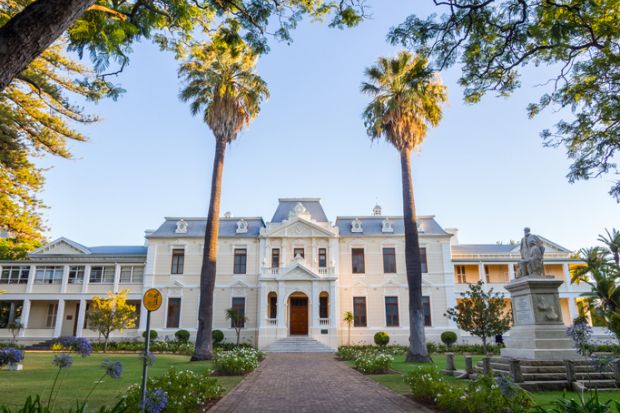Stellenbosch University academics have been criticised by South Africa’s higher education minister after the institution’s senate refused to call for a ceasefire in Gaza.
Pro-Palestinian protests erupting on campuses across South Africa have particular political resonance because it was the country that brought a case before the International Court of Justice alleging that Israel was committing genocide in the Gaza Strip.
The motion before Stellenbosch’s senate called for an immediate ceasefire in the war, a condemnation of the destruction of the Gaza education sector and opposition to attempts to “curtail academic freedom by labelling criticism of Israel or Zionist policies as antisemitism”.
In an extraordinary meeting on 30 April, a majority of the university body rejected it. Wim de Villiers, Stellenbosch’s vice-chancellor, said that the university expressed “deep empathy with all those who suffer, directly and indirectly, as a result of the unfolding humanitarian crisis”.
But Blade Nzimande, the higher education minister, claimed the “morally bankrupt and profoundly racist” decision took the country back to its “darkest days”, when Israel and the apartheid South African government developed a close military alliance.
“By taking this repugnant decision, the senate of Stellenbosch University has essentially legitimised the mass murder and dispossession of the oppressed people of Palestine, including that of fellow academics,” he said.
Times Higher Education understands some members of the almost-400 person senate, which includes senior leadership, professors and elected academics, criticised the motion as “political grandstanding” and argued it would restrict academic freedom and force the body into taking sides in the Israel-Gaza conflict.
One senate member, speaking anonymously, said they voted against the motion as a matter of procedure, because it was not the appropriate forum through which to express a collective institutional position.
They said they were in support of any initiative that would oppose the war between Israel and Hamas, but they had a problem with singling out the Gaza war over the conflicts in Sudan and Ukraine.
While the University of Cape Town senate has called for a ceasefire, other institutions within South Africa have not yet been faced with such a dilemma. Others, including the University of Johannesburg and the University of Western Cape, have made public statements after decisions by their councils or executive teams.
Another Stellenbosch senate member claimed that the result reflected Stellenbosch’s neoliberal values, its deep conservatism and even racism – tied to Israel’s strong support of apartheid South Africa.
Stellenbosch remained a “deeply alienating space for academics, students and administrators who are not white”, they said, with a “white caucus” who saw transformation as a “checklist exercise” and a threat to their status quo.
“The painful reality is that so much of the opposition was reminiscent of the same kind of language used to justify apartheid in South Africa,” the senate member said.
“It was clear to me and many others that the lives of people who are not white simply hold no value.”
Almost 100 senate members have now signed a letter expressing their “deep dismay” at the result and their concern at “deep-seated small pockets of conservatism” within the university.
The group say they are troubled that Stellenbosch failed to condemn the “egregious actions” of the Israeli state. “Anything less would signify a failure to fulfil our moral and ethical obligation to oppose one of the most brutal forms of educational devastation inflicted upon a population,” they add.
In a statement, Stellenbosch said calling a decision by the senate racist was contrary to its principles of individual freedom of expression and institutional integrity.
“In a country with South Africa’s legacy of racism, the repetition of such charges without evidence is a grave and questionable accusation,” the statement said.
“SU is not the only university, locally or globally, that has refrained from an institutional stance on this issue to safeguard academic freedom, and it has repeatedly expressed its sympathy and compassion for those affected by the humanitarian crisis unfolding in Gaza.”




